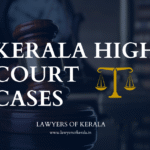Evidence Act, 1872 – Section 68 Proviso – Succession Act, 1925 – Section 63(c) – Partition Suit – Validity of Will – Deceased, left properties (item Nos. 1 to 9) without a gift or Will; plaintiff sought partition, resisted by defendants claiming a Will (Ext.B1) dated 14.07.1985 for item No. 6 – Trial court and appellate court rejected the Will due to inconsistencies in evidence of propounder (DW1) and attesting witness (DW2), suspecting execution circumstances – High Court upheld concurrent findings, affirming propounder’s failure to dispel suspicious circumstances – Appeal dismissed, no interference with partition decree – No costs.
Citations: 2025 KER 40792 : 2025 (6) KLR 112 : 2025 KLT OnLine 2138
Court: High Court of Kerala
Judge: Hon’ble Mr. Justice Easwaran S.
Case Number: RSA No. 874 of 2015; June 11, 2025
Facts
-
Background: The suit properties (item Nos. 1 to 9) belonged to Karunakaran Nair, who died intestate on August 20, 1985. The plaintiff, P.T. Sreenivasan Nair, and defendants were his legal heirs. Karunakaran Nair allegedly had three wives: Lakshmibai (deceased, mother of defendants 1–4), and defendants 5 and 11 (disputed as wives). The plaintiff sought partition of the joint properties, claiming no Will or gift was executed by Karunakaran Nair.
-
Plaintiff’s Claim: On August 15, 2004, the plaintiff issued a lawyer’s notice for partition, which was refused, leading to the filing of OS No. 132 of 2004 in Munsif’s Court, Perambara.
-
Defendants’ Contentions: Defendants (legal heirs of the 1st defendant) denied the plaintiff’s status as a legal heir and disputed Karunakaran Nair’s marriages to defendants 5 and 11, asserting Lakshmibai was his only wife. They claimed a Will (Ext.B1) dated July 14, 1985, bequeathed item No. 6 to the 1st defendant, excluding it from partition. They also alleged incomplete property inclusion and incorrect property extents in the plaint.
-
Procedural History: The trial court decreed the partition, rejecting the Will’s validity due to suspicious circumstances. The Sub Court, Koyilandy, dismissed the appeal (AS No. 30 of 2014) on February 9, 2015. The appellants (supplementary defendants 22, 23, 26–28) filed this second appeal.
Issues
-
Whether the marriages of Karunakaran Nair with defendants 5 and 11 were proved.
-
Whether the plaintiff and defendants 6–10, 12–21 were Karunakaran Nair’s children.
-
Whether the courts below erred in concluding the legal status of defendants 5 and 11.
-
Whether the courts’ findings on the invalidity of Ext.B1 Will were erroneous.
Arguments
-
Appellants: Focused primarily on the validity of Ext.B1 Will, arguing that the 1st defendant discharged the burden under Section 68 of the Indian Evidence Act, 1872, and Section 63(c) of the Indian Succession Act, 1925, by examining the scribe/attesting witness (DW2). They contended that the plaintiff failed to pursue expert analysis of the Will (IA No. 82/2007), warranting an adverse inference.
-
Respondents: Argued that the propounder (1st defendant) failed to dispel suspicious circumstances surrounding the Will’s execution, as evidenced by inconsistencies between DW1 (1st defendant) and DW2. The trial court’s decision not to rely on the un pursued expert opinion application was justified, given the suspicious circumstances.
Holding
-
The High Court limited its examination to the validity of Ext.B1 Will, as agreed by both parties.
-
The court held that the 1st defendant failed to discharge the burden of proving the Will’s genuineness under Sections 68 of the Indian Evidence Act and 63(c) of the Indian Succession Act.
-
Inconsistencies between DW1’s claim (Will received after testator’s death) and DW2’s testimony (Will handed over on execution date with DW1 present) created suspicious circumstances.
-
Additional suspicions arose from DW1’s claim that the testator was bedridden for months before death, contrasting with DW2’s assertion that the testator visited his office to execute the Will.
-
The plaintiff’s failure to pursue expert analysis (IA No. 82/2007) did not absolve the propounder’s duty to dispel suspicions.
-
The concurrent findings of the trial and appellate courts were upheld, and the appeal was dismissed without costs.
Legal Principles
-
Proof of Will: Under Section 68 of the Indian Evidence Act, 1872, at least one attesting witness must be examined to prove a Will’s execution. Section 63(c) of the Indian Succession Act, 1925, requires the testator’s signature to reflect intent.
-
Burden of Proof: The propounder must prove the Will’s due execution and the testator’s capacity. If suspicious circumstances arise, the propounder must dispel them (H. Venkatachala Iyengar v. B.N. Thimmajamma, AIR 1959 SC 443; Surendra Pal v. Saraswati Arora, (1974) 2 SCC 600).
-
Suspicious Circumstances: Inconsistencies in witness testimonies, the propounder’s participation in execution, or unnatural circumstances (e.g., testator’s health) may raise suspicions (Sarat Kumari Bibi v. Sakhi Chand, (1928) LR 56 IA 62).
-
Concurrent Findings: Under Section 100 of the Code of Civil Procedure, 1908, concurrent findings of fact by lower courts are not disturbed unless perverse.
Disposition
-
Appeal dismissed.
-
No costs awarded.

For Appellants : Adv. B. Krishna Mani Office Address 41/426202b, 2nd Floor, |
For Respondents : Advs. B.V. Joy Sankar B. Krishnan & T.M. Velayudhan |


